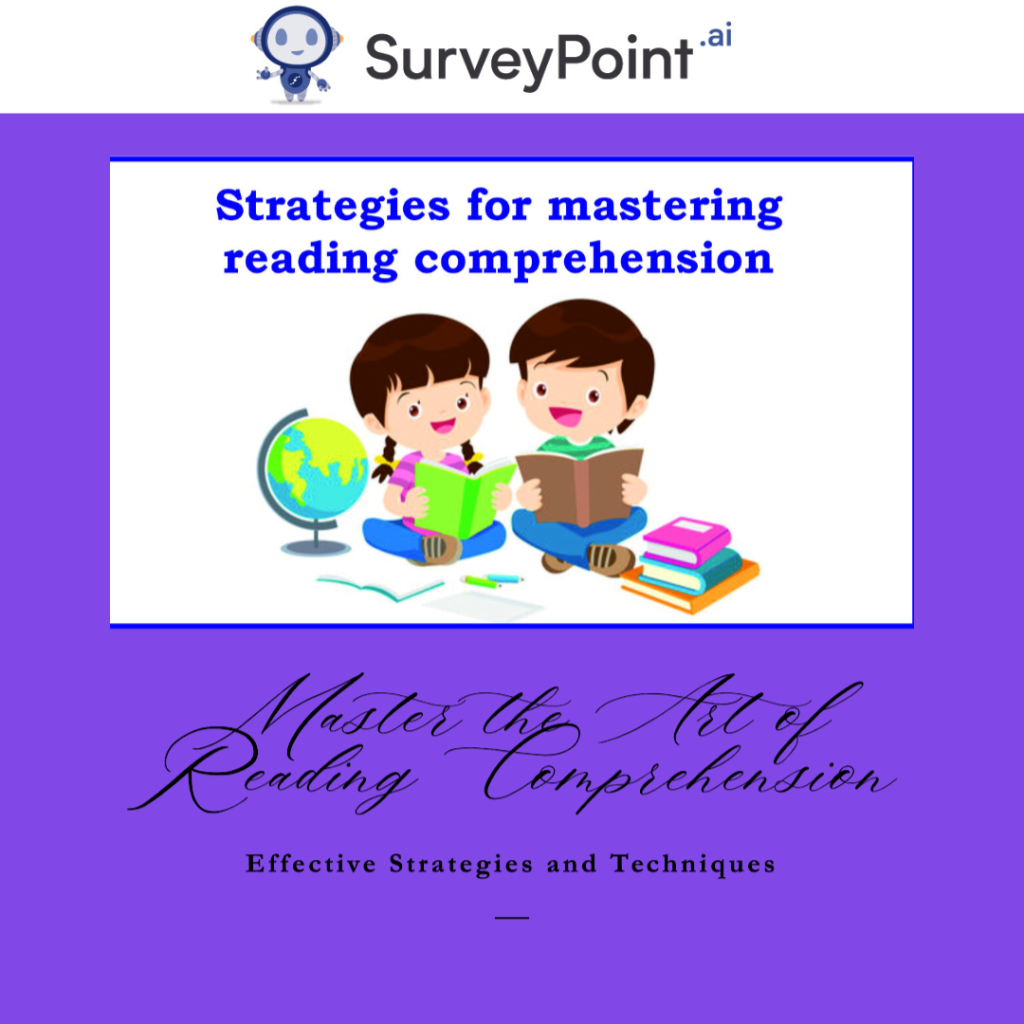Reading comprehension is a fundamental skill that underpins learning and success in education. Whether you are a student trying to excel in your coursework or an individual seeking to improve your critical reading skills, mastering reading comprehension is essential.
In this article, we will explore a variety of strategies, techniques, and exercises to enhance your reading comprehension skills. By the end, you will have a toolkit of effective methods to help you become a more proficient reader.

Why is Reading Comprehension important?
Reading comprehension is the ability to understand, interpret, and retain the information presented in a text. It is a skill that extends beyond the classroom and is integral to everyday life.
Being proficient in reading comprehension not only enhances academic performance but also contributes to effective communication, problem-solving, and critical thinking. As students and lifelong learners, improving your reading comprehension skills should be a top priority.
Reading Comprehension Strategies
- Active Reading: One of the most effective reading comprehension strategies is active reading. This involves engaging with the text actively, asking questions, making predictions, and summarizing key points as you read. By doing so, you become an active participant in the reading process, which significantly improves your understanding.
- Preview the Text: Before diving into a text, take a moment to preview it. Read the title, subtitles, headings, and any other organizational elements. This will provide you with a roadmap for what to expect, making it easier to comprehend the material.
- Annotate: Don’t be afraid to mark up your texts. Underline important sentences, jot down notes in the margins, and highlight key points. This not only helps you remember information but also keeps you engaged with the text.
- Summarize: After each section or chapter, pause to summarize what you’ve read in your own words. This practice reinforces your understanding and retention of the material.
- Discuss with Others: Engaging in discussions with peers or educators about the reading material can be immensely beneficial. It allows you to gain different perspectives and reinforces your understanding.
Enhancing Reading Comprehension
- Build Your Vocabulary: A strong vocabulary is a key component of reading comprehension. Make it a habit to learn new words regularly and practice using them in your daily conversations and writing.
- Context Clues: When encountering unfamiliar words while reading, try to infer their meanings from the context of the text. This skill is particularly useful for standardized tests like the SAT or GRE.
- Read Widely: Exposure to different types of texts and genres can enhance your comprehension abilities. Challenge yourself with a variety of materials, from literature to scientific articles.
- Take Breaks: If you’re tackling a lengthy text, take short breaks to rest your mind. This can prevent mental fatigue and improve comprehension.
Effective Reading Comprehension Techniques
SQ3R Method: SQ3R stands for Survey, Question, Read, Recite, and Review. It’s a structured approach to reading that helps you actively engage with the material. First, survey the text, then formulate questions, read the text, recite what you’ve learned, and finally, review the material to reinforce your understanding.
- Mind Mapping: Create a visual representation of the text’s main ideas and supporting details through mind mapping. This technique helps organize information and aids in comprehension.
- Visualization: As you read, create mental images of the content. Visualizing the information can make it more concrete and memorable.
- Chunking: Break down complex texts into smaller, manageable chunks. This makes it easier to digest the material and prevents information overload.
Tips for Better Reading Comprehension
- Set Realistic Goals: Define your reading goals. Are you reading for leisure, research, or academic purposes? Setting clear objectives will help you approach the text with purpose.
- Eliminate Distractions: Find a quiet, comfortable place to read without distractions. This allows you to focus on the material without interruptions.
- Practice Regularly: Like any skill, reading comprehension improves with practice. Make reading a daily habit to continually enhance your abilities.
- Stay Informed: Keeping up with current events and diverse topics broadens your knowledge base, making it easier to comprehend a wider range of materials.
Reading Comprehension Exercises
- Practice Tests: If you’re preparing for standardized exams, such as the SAT or GRE, take advantage of practice tests. These simulate exam conditions and help you become familiar with the types of questions asked.
- Close Reading: Choose a short passage or article and engage in close reading. Analyze the text in detail, paying attention to word choice, tone, and rhetorical devices.
- Read Aloud: Reading aloud forces you to slow down and engage with the material on a different level. It’s an excellent exercise for enhancing comprehension.
Mastering Reading Comprehension
- Reading Comprehension in Education: Educational institutions recognize the importance of reading comprehension. They often incorporate it into their curriculum and provide resources to help students improve their skills. Seek out reading comprehension workshops, tutoring, or online resources offered by your school or university.
- Critical Reading Skills: Critical reading goes beyond understanding the surface meaning of a text. It involves analyzing, questioning, and evaluating the content. Develop your critical reading skills by questioning the author’s intent, identifying biases, and assessing the evidence presented.
- Reading Comprehension for Students: If you’re a student, make use of campus resources like libraries, study groups, and professors’ office hours. These can provide additional support and guidance in mastering reading comprehension.
Conclusion
Reading comprehension is a skill that can be honed and improved through dedicated effort and effective strategies. Whether you are a student striving for academic success or someone seeking to become a more critical reader, the techniques and exercises mentioned in this article will undoubtedly enhance your reading comprehension skills.
Remember, practice and persistence are key to mastering this essential skill, which will benefit you not only in your academic pursuits but in your daily life as well.

